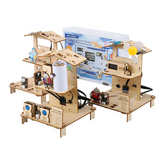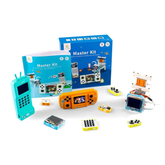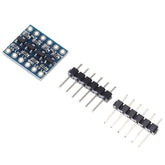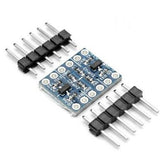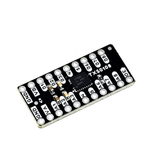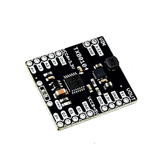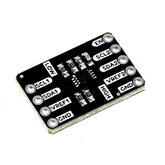-
4 Channel (I2C or SPI) 3.3V-5V Bi-Directional Logic Level Converter4 Channel (I2C or SPI) 3.3V-5V Bi-Directional Logic Level Converter If you've ever tried to connect a 3.3V device to a 5v system, you know what a challenge it can be. The bi-directional logic level converter is a small device that safely steps down...
- Rs. 19
Rs. 24- Rs. 19
- Unit price
- per
Save Rs. 5 -
2 Channel Logic Level Converter (I2C, UART, 5V-3.3V)2 Channel Logic Level Converter (I2C, UART, 5V-3.3V) The 2 Channel Logic Level Converter is a small device that safely steps down 5V signals to 3.3V and steps up 3.3V to 5V. This level converter also works with 2.8V and 1.8V devices. Each level...
- Rs. 20
Rs. 34- Rs. 20
- Unit price
- per
Save Rs. 14 -
SmartElex 8 Channel Level Shifter – TXS0108E Bi-Directional Logic Converter ModuleSmartElex 8 Channel Level Shifter – TXS0108E Bi-Directional Logic Converter Module The SmartElex 8 Channel Level Shifter is a compact and efficient module designed to safely convert signal voltages between devices operating at different logic levels. It’s based on the TXS0108E chip, which allows...
- Rs. 99
Rs. 224- Rs. 99
- Unit price
- per
Save Rs. 125 -
SmartElex TXB0104 Logic Level Converter – Single SupplySmartElex TXB0104 Logic Level Converter – Single Supply The SmartElex TXB0104 Logic Level Converter – Single Supply is a compact module designed to safely shift voltage levels between different digital systems. This logic level converter allows smooth communication between devices operating at 1.8V, 3.3V,...
- Rs. 255
Rs. 325- Rs. 255
- Unit price
- per
Save Rs. 70 -
SmartElex PCA9306 Logic Level Translator Breakout ModuleSmartElex PCA9306 Logic Level Translator Breakout Module The SmartElex PCA9306 Logic Level Translator Breakout Module is a compact solution designed to shift signal voltages between different logic levels in electronic systems. This PCA9306 level translator helps connect components that operate at mismatched voltages, such...
- Rs. 51
Rs. 89- Rs. 51
- Unit price
- per
Save Rs. 38
for additional 5% discount! + Redeem RC COINS 👇



